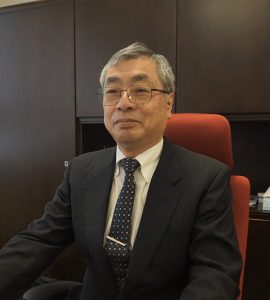Message from the President
Message
National Institute of Technology, Kisarazu College (Kisarazu KOSEN) is located in Kisarazu City, Chiba Prefecture, where the completion of highway networks to Tokyo and the international airports, Haneda and Narita, provide us a convenient access to domestic and international cities. With a beautiful view of Tokyo Bay from our campus, around 1,100 students majoring in science and engineering in five-years regular course from the age 15 and two-years advanced course, which are equivalent ages to Japanese high school and university.
KOSEN’s primary mission is to foster creative and practical engineers, and vocational education is a feature that integrates general and professional education and practical training based on theoretical background. Especially for the globalization of Japanese higher-level education, our mission now is to provide the engineers with intellectual, refined and being-broad mind, liberal and engineering-based spirit to face any challenge, and with a wide perspective, which means thinking globally.
Our system is widely admired for its high-level vocational education, and was evaluated both in industrial and academic sectors because of our graduates’ success as engineers, managers and researchers for the past half century.
Our academic program for diploma covers five programs of engineering, namely mechanical engineering, electrical electronic engineering, control engineering, information and computer engineering, and civil engineering, together with three advanced bachelor courses of mechanical and electrical, control and information, and civil and environment. Every year about half of our graduates find industrial employment as engineers, while the other half of them transfer to four-year university from the diploma course, and progress to graduated master’s program from our advanced course.
In Kiarazu KOSEN, we have accepted international students to the third year so far, and recently we have also enhanced short-term student exchanging programs between overseas universities and polytechnics. In addition to the academic learning, we have also encouraged students to participate in sports and cultural activities as their individuality-building up opportunities.
Among over 120 staffs of Kisarazu KOSEN, many educational and technical members are active in their specialty researches to collaborate with industry and other social services. As compared to most Japanese universities, we have relatively satisfactory instruments and facilities in related fields of engineering. Through Kisarazu KOSEN’s activities, we wish to contribute to Japanese society and to have partnership with worldwide organizations.
YAMAZAKI Makoto


